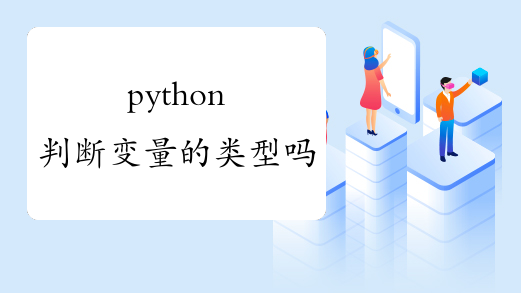python判断变量的类型吗
发布时间:2020年11月19日 20:34:04
来源:环球青藤
点击量:637
【摘要】python的数据类型有:数字(int)、浮点(float)、字符串(str),列表(pst)、元组(tuple)、字典(dict)、集合(set)一般通过以下方法进行判断:1

python的数据类型有:数字(int)、浮点(float)、字符串(str),列表(pst)、元组(tuple)、字典(dict)、集合(set)
一般通过以下方法进行判断:
1、isinstance(参数1,参数2)
描述:该函数用来判断一个变量(参数1)是否是已知的变量类型(参数2) 类似于type()
参数1:变量
参数2:可以是直接或间接类名、基本类型或者由它们组成的元组。
返回值: 如果对象的类型与参数二的类型(classinfo)相同则返回 True,否则返回 False
例子:
#判断变量类型的函数
def typeof(variate):
type=None
if isinstance(variate,int):
type = "int"
epf isinstance(variate,str):
type = "str"
epf isinstance(variate,float):
type = "float"
epf isinstance(variate,pst):
type = "pst"
epf isinstance(variate,tuple):
type = "tuple"
epf isinstance(variate,dict):
type = "dict"
epf isinstance(variate,set):
type = "set"
return type
# 返回变量类型
def getType(variate):
arr = {"int":"整数","float":"浮点","str":"字符串","pst":"列表","tuple":"元组","dict":"字典","set":"集合"}
vartype = typeof(variate)
if not (vartype in arr):
return "未知类型"
return arr[vartype]
#判断变量是否为整数
money=120
print("{0}是{1}".format(money,getType(money)))
#判断变量是否为字符串
money="120"
print("{0}是{1}".format(money,getType(money)))
money=12.3
print("{0}是{1}".format(money,getType(money)))
#判断变量是否为列表
students=['studentA']
print("{0}是{1}".format(students,getType(students)))
#判断变量是否为元组
students=('studentA','studentB')
print("{0}是{1}".format(students,getType(students)))
#判断变量是否为字典
dictory={"key1":"value1","key2":"value2"}
print("{0}是{1}".format(dictory,getType(dictory)))
#判断变量是否为集合
apple={"apple1","apple2"}
print("{0}是{1}".format(apple,getType(apple)))
返回:
2、通过与已知类型的常量进行比较
例子:
#判断变量类型的函数
def typeof(variate):
type1 = ""
if type(variate) == type(1):
type1 = "int"
epf type(variate) == type("str"):
type1 = "str"
epf type(variate) == type(12.3):
type1 = "float"
epf type(variate) == type([1]):
type1 = "pst"
epf type(variate) == type(()):
type1 = "tuple"
epf type(variate) == type({"key1":"123"}):
type1 = "dict"
epf type(variate) == type({"key1"}):
type1 = "set"
return type1
# 返回变量类型
def getType(variate):
arr = {"int":"整数","float":"浮点","str":"字符串","pst":"列表","tuple":"元组","dict":"字典","set":"集合"}
vartype = typeof(variate)
if not (vartype in arr):
return "未知类型"
return arr[vartype]
#判断变量是否为整数
money=120
print("{0}是{1}".format(money,getType(money)))
#判断变量是否为字符串
money="120"
print("{0}是{1}".format(money,getType(money)))
money=12.3
print("{0}是{1}".format(money,getType(money)))
#判断变量是否为列表
students=['studentA']
print("{0}是{1}".format(students,getType(students)))
#判断变量是否为元组
students=('studentA','studentB')
print("{0}是{1}".format(students,getType(students)))
#判断变量是否为字典
dictory={"key1":"value1","key2":"value2"}
print("{0}是{1}".format(dictory,getType(dictory)))
#判断变量是否为集合
apple={"apple1","apple2"}
print("{0}是{1}".format(apple,getType(apple)))
返回:
补充:
isinstance() 与 type() 区别:
type() 不会认为子类是一种父类类型,不考虑继承关系。
isinstance() 会认为子类是一种父类类型,考虑继承关系。
如果要判断两个类型是否相同推荐使用 isinstance()。
相关教程推荐:Python视频教程
以上就是小编分享的关于python判断变量的类型吗的详细内容希望对大家有所帮助,更多有关python教程请关注环球青藤其它相关文章!
上一篇:怎么查看python版本?
下一篇:python数据分析师需要学什么
就业培训申请领取


环球青藤
官方QQ群扫描上方二维码或点击一键加群,免费领取大礼包,加群暗号:青藤。 一键加群
最新文章
Python编程各地入口
环球青藤官方微信服务平台




刷题看课 APP下载
免费直播 一键购课
代报名等人工服务
Python编程热点排行






